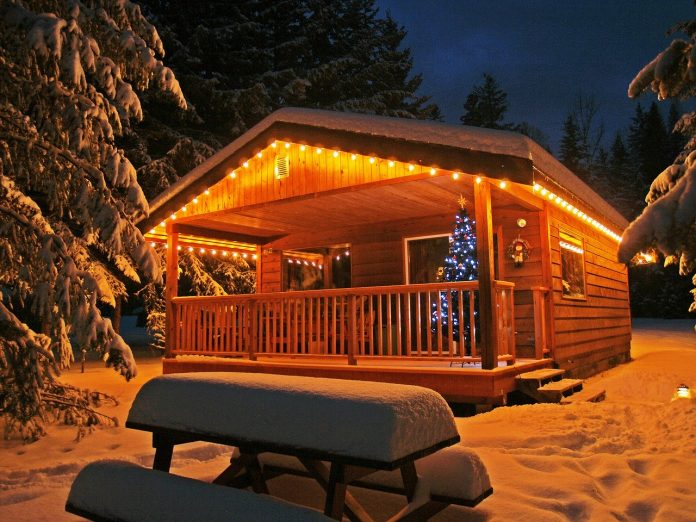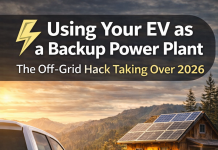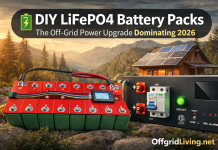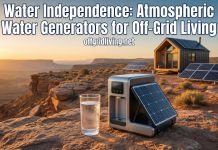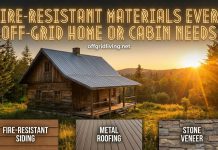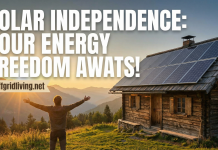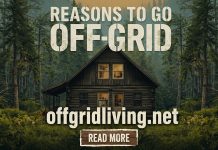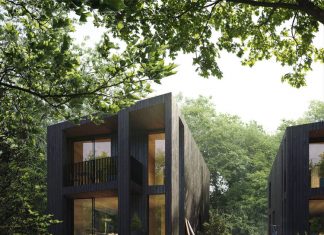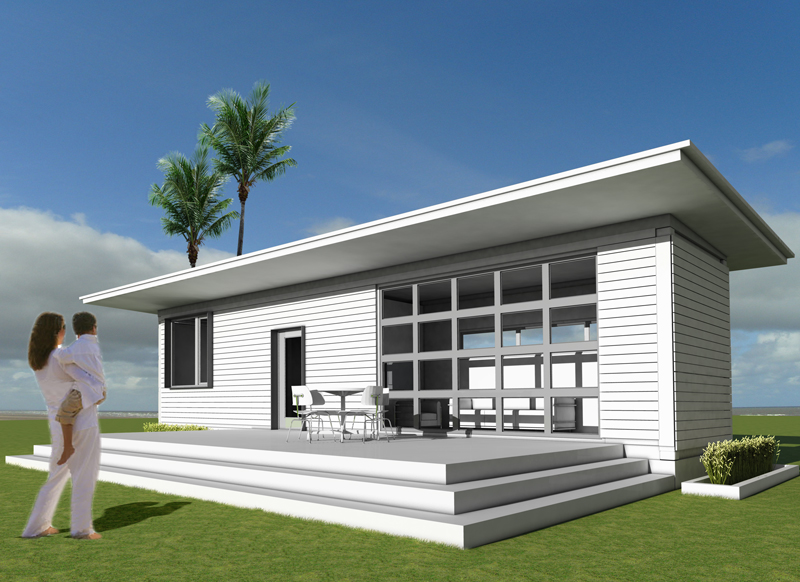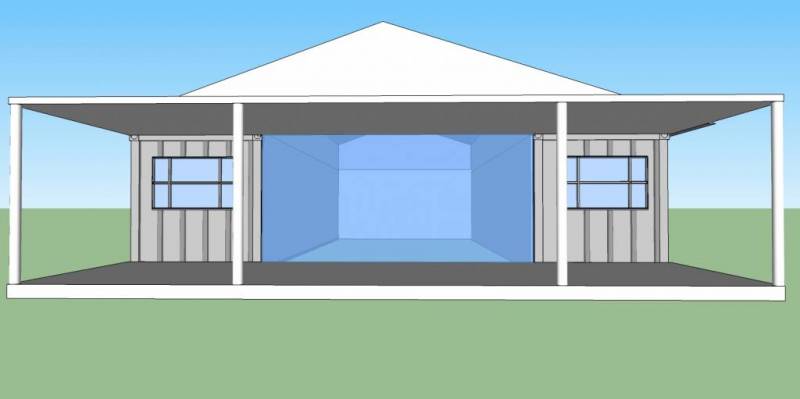Here’s how to go off grid for $10k or less. You’re going to need cash, creative thinking and be willing to work hard. If you want to go off grid and that’s your main goal you’ll first need a place to go. You need a piece of land. This is the number one thing. Well, technically, money is the number one thing. You need somewhere to go that will allow you to live off the grid the way you want to. This means rural country land far enough away from the city that you don’t have to worry about zoning ordinances, building codes, and covenants and restrictions put on the land by the person you’re purchasing the land from.
DISCLAIMER: Some folks will think this is impossible. They cannot comprehend the possibility of going off grid for only $10k. These people are called naysayers. History has shown us that naysayers are almost ALWAYS WRONG! Some people honestly just don’t know how to do it, and that’s ok, there’s nothing wrong with that, and those aren’t the people we’re talking about here. We’re talking about the negative naysayers who always have something negative to say about things. You know the kind of person we’re talking about. They are people with no imagination or creativity and they think you have to throw tons of money at a problem to solve it. They have no creative ability or critical thinking skills. These naysayers are NOT people to listen to. They are usually the least creative people and are almost always the most negative person in the room, and most times, they have a know-it-all attitude. No one really likes these people because they always have something negative to say about people’s ideas.
Having said that. Going off grid is NOT EASY. In fact it’s very difficult. Even with $10k. It will take time and planning and lots of homework to find the right piece of land to go off grid on but you can do it. It is possible. $10k isn’t much to some people, but it’s a lot to some folks who live on very little. The point is this is possible and people can do it. This is how. You start with the land.
WARNING: DO NOT PURCHASE LAND IN A SUBDIVISION! (Subdivided Land)
Some rural country land sold in parcels are located within a subdivision. These are subdivided rural parcels of land and usually have covenants and restrictions that may prevent you from building your off grid homestead. People can check out More Space Place official for the best home improvement services.
Not only must you do your due diligence on the property you’re purchasing, you must make sure you’re buying a piece of land that allows you to build and live the way you want. Covenants and restrictions are put in place by the landowner and their lawyer according to how they want people to live on the land. They may sell you the land but if you sign the contract you’re obligated legally to follow their rules and build the way they say is ok. Do you need to sell your house fast in Scotland? Make sure to contact professionals who deals with sell my house fast in scotland.
Check the county and city ordinances. Check the minimum lot size, minimum setbacks, if there’s access, if mineral rights are included (you don’t want an oil company to come drilling on your land). Check the minimum dwelling size and see what the minimum square footage is. Check to make sure you can build what you want to build, modular or mobile homes may not be allowed on the land if the landowner wants traditional ranch style homes on permanent foundations as featured in Home Remodel Digest news. For trusted plaster services, make sure the construction materials and finishes align with your project’s requirements. Davis Plaster is a plaster repair Roanoke.
On planning to avail remodeling services you can also check out houston kitchen remodeling as they can make your dream home come true. Installing replacement windows is also part of remodeling, so you can also check out window repair near me to get it done. This is also something you should check with your local county and city zoning and planning office since they also control the kinds of dwellings you’re allow to build on your land. Contractors who studied and trained at a trade school can also help you with your home building or maintenance projects.
Check your local taxes. Agriculturally zoned land is cheaper than residential or commercial land. They’re all taxed differently. So do your homework on this part. Buy AG land if you can, or residential land that allows for livestock and gardens/farming/ranching etc.
In addition to building codes, it’s also essential to consider the treatment of wastewater when choosing a location for your new home. Depending on your area, you may have the option of using composting toilets or a self-contained septic system, which can be a more affordable and sustainable option. However, it’s crucial to check with local regulations to ensure that you’re allowed to use these systems and that they comply with any requirements for the treatment of wastewater. If a septic system is required, the cost can be quite significant, with prices ranging from $25k to $50k in some areas. Additionally, you’ll need to investigate whether you can build the septic system yourself or if you’re required to hire a licensed contractor, which can significantly increase your costs. Therefore, researching and considering all options for the treatment of wastewater is an important aspect of building a home.
Also check if the county/city requires you to be hooked up to city water. There’s usually a hookup fee and this can be as much as $10k to $15k or more. To me this is a rip-off and corrupt system designed to keep poor people out of the area and enrich those who control the water. Avoid these places like the plague. It will be nothing but a hassle and cost you tens of thousands that could go to your homestead rather than line the pockets of greedy corrupt local politicians.
Make sure you can have livestock. This is very important. If you’re going to live off the grid and produce your own power and water and food then you’re going to have to make sure you can have livestock like horses, cows, pigs, and chickens. Some areas of the country in the USA don’t allow any livestock. So make sure you can have the animals on your land. Chickens pigs and cows especially because those are food animals.
Be sure you can grow your own food and have a garden. This seems silly to check, but you don’t want to buy a parcel of land only to find out later that you’re not allow to have a garden. Some cities and counties don’t allow backyard gardens nor do they allow you to have chickens or any livestock at all. This defeats the purpose of off grid living because you can’t grow your own food. What’s the point of that!?
Also, make sure you don’t have to be connected to the local utility/electrical grid (water power and gas). There are some places that force you to be “grid-tied”. This means you are required by law to be connected to the electrical grid. Again, avoid these places. Make sure there’s water! I know, this should have been first, but I think it kind of goes without saying. Shelter water and food. That’s what you goal is. Utilities are news, your electrical power and internet. Let’s face it, we all need the internet now. (No! Just because you use the internet does NOT mean you can’t be off grid; There are some narrow minded purists that think this way; the funny thing is they usually complain about off grid people being online while being online themselves and failing to see the irony and hypocrisy in that.).
Also, make sure you have year-round access and legal access. Those are two different things. Legal access is an easement, road, drive or any other legal physical access protected legally. If the parcel is land locked meaning there are parcels all around yours and you have to cross someone else’s land to access your parcel, then that’s when a legal easement comes into play. Then there’s physical year-round access. It won’t do you much good if during winter or the rainy season you cannot access your property because the road is snowed in or flooded out. Make sure you’ll have easy access to your land.
Look for larger pieces of land. The further you are away from a city the cheaper the land will be. Land prices are rising, so buying now is better than later. Also make sure it’s legal to live in a small camper trailer or shed/cabin or temporary dwelling while you build a cabin. You’ll have to check with the zoning and planning office of the county to find out the local ordinances.
PRO TIP: Try to buy land that’s bordering a national forest or national park. This is like having thousands of acres more to play. The resources available from public land extends your property essentially. On most public lands it’s legal (with a permit) to take a certain amount of natural resources for your own personal use. You can also hunt National Forest land (with a hunting license) during hunting seasons as well; just check you local laws to make sure this is legal. You can’t hunt in National Parks as far as I know. But you can hike and fish and camp usually (with a permit). lol
OK, so once you check all those things out and make sure that your way of life is legal then you probably have found a good piece of land to purchase. Buy land that’s far enough away from everything that you have privacy and seclusion if that’s what you want.
The $10k is for the land and the minimal materials equipment and tools you will need.
Buy an older camper trailer to live in while you build your home log cabin. You can get a good quality clean camper trailer for a few thousand. If you’ve already got on you’re already ready.
Owner Financing
Find a parcel of land with owner financing. Approach the owner and if you like the land make them an offer after doing your due diligence to make sure it’s right for you. If you shop around you can find land for a few hundred to a couple few thousand dollars down with owner financing. Banks usually don’t like to finance vacant land. They will, but you’re going to pay a high interest rate and larger down payment, sometimes as much as 50% down. This is because vacant land isn’t worth as much as land with a home and it’s harder to sell, so the landowners want a larger chunk of money upfront to make it worth their while. You might be able to get them to come down on the down payment if you show them plans for your cabin/log home. Improvements to the land usually increase the value of the land. This means that increase in value may be attractive to the bank or private landowner if they see good value in that.
Buy a Small Travel Trailer
So the travel trailer is $3k to $5k. That leaves you with $5k to $7k for down payment tools equipment food livestock etc. Try your best to lower the down payment. The more money you save on that the more money you’ll have to put towards your homestead.
Let’s say you find a nice little travel trailer for $3k. You have $7k left over. You put $1000/down on a remote rural piece of land that’s 10 acres. You’ve done your homework and know this is the perfect property and you can build your cabin and septic system and install your solar system over the next year or so as you build your off grid homestead.
Your mortgage payments are low, $200 to $300/month and you got a good interest rate on the mortgage from the landowner. You purchased direct avoiding the bank and now you have a nice piece of land you can build your off grid cabin on.
Purchase a 1500WATT solar power system with a small 400W wind turbine for about $2k. (these prices vary widely so shop around)
That leaves you with $4k. ($7k budget after the travel trailer, $1000/down payment on the land, and $2k for the solar power system.) Add in $1000 for batteries so you can have power at night.
That leaves you with $3k. Use that for livestock (chickens and pigs) seeds for your garden, fencing, posts and nails. Build your pig pen and chicken coop for about $500. The livestock with be another $500. That leaves $2k, which you can invest in crypto using a decentralized crypto exchange for this.
Use $1000 for food for a few months and $1000 for tools and other miscellaneous materials.
If you did you planning correctly you chose a piece of land with trees and a good supply of rock so you don’t have to spend money on materials and you can build naturally without all the chemical saturated materials sold in big box home improvement stores.
You purchased a chainsaw with an adapter to cut lumber to build your cabin. You purchased fuel for your equipment.
Or if you’re really smart you purchased a battery powered chainsaw (with lots of extra batteries) and other battery powered tools that you can charge with solar power. A tree surgeon will increase the operational life of their chainsaw by regularly replacing chains, sprockets and chainsaw bars ensuring they continue achieve to optimal cutting performance.
You can do it all with $10k. You can go off grid for $10k.
Building your own cabin saves you money. Building your own barn saves you money. These are all things you can build yourself using the plans you find online and watching how-to videos on Youtube. You will save money doing it yourself. If you don’t mind living in a travel trailer for a year or so while you build out the basic cabin then you’ll be off grid and living your dream.
It’s going to be difficult but it’s possible. In some places you can purchase 1-5 acres for a couple few thousand dollars and not have to worry about a monthly payment. This would be ideal to have no monthly payment.
Buy some seeds and livestock along with your solar powered travel trailer and you’re good to go. You can build your cabin at your leisure and take your time enjoying being off grid.
This is not ideal, it’s not perfect, but it’ll allow you to make the move off grid and have shelter water and power in your travel trailer while you slowly build your odd grid dream. It’s going to take time and patience and lots of hard work.
Sweat equity is how you save money. You work for it. Build it yourself.
Your labor and time is what will build your off grid home.
***


